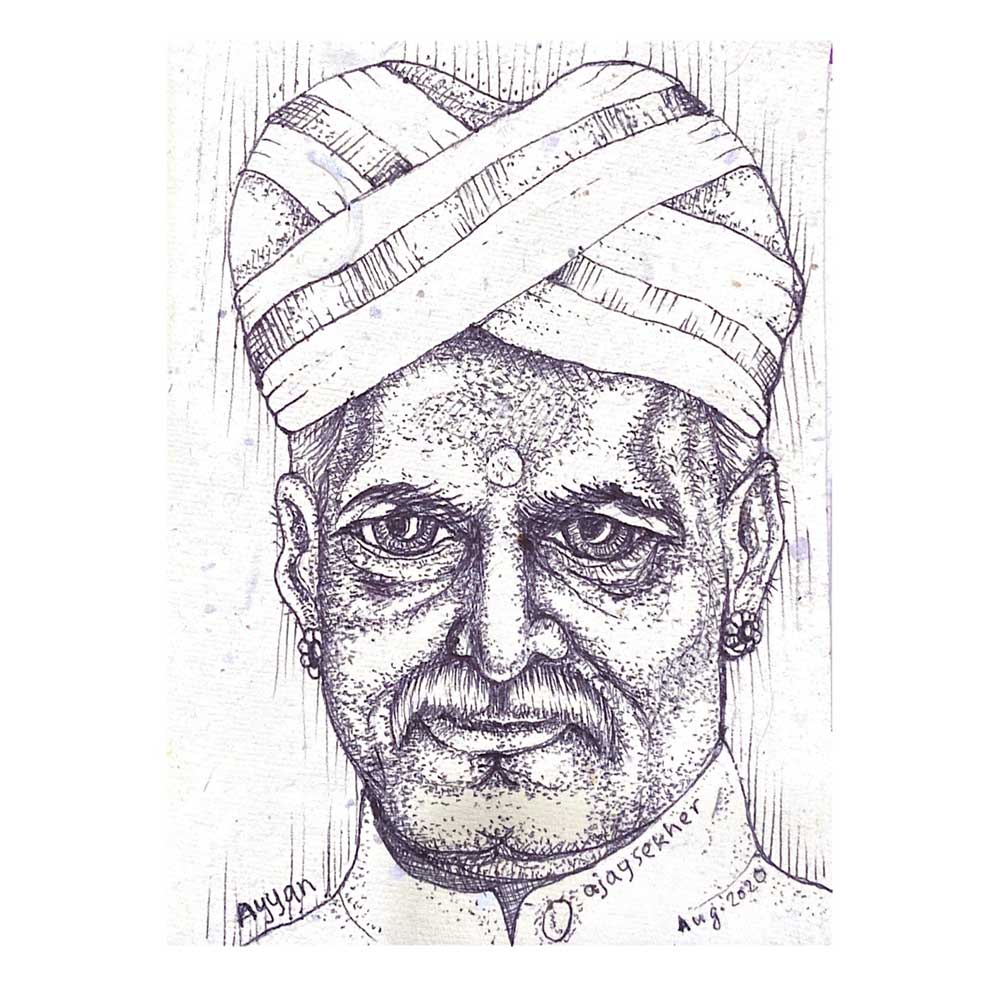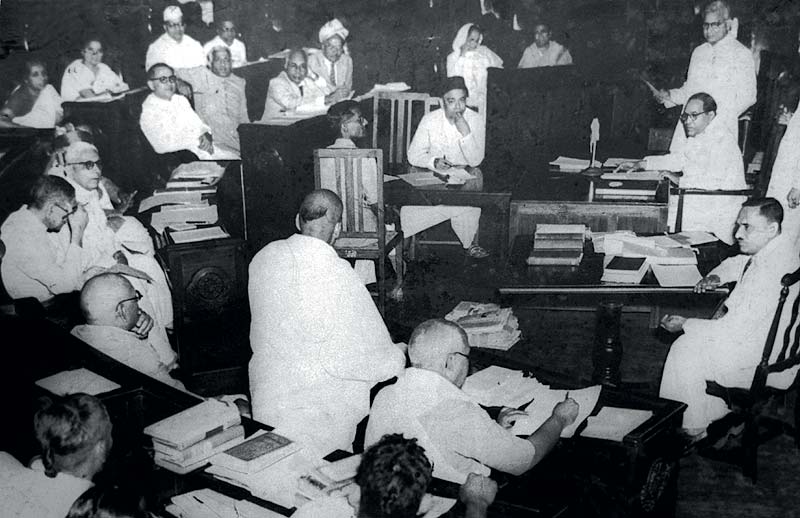Ayyankali birth anniversary: 28 August 1863 – 18 June 1941
Ayyankali launched the struggles for the human rights and right to education of the Dalits in Travancore, the princely state that is now southern Kerala and a few taluks of Tamil Nadu, in the early 1890s. It was done soon after the historic 1888 consecration of “Ezhava Shiva” in Aruvippuram by the Avarna sage Narayana Guru that reimagined Kerala as a model abode of fraternity without caste and religious cleavages, and his call to “educate so that you are liberated and organize so that you are empowered”. It was a rediscovery of the Buddhist “triple gem” in the Modern Era. Ayyan was a true leader of the people. He organized the earliest public protests and collective struggles for social justice and civil liberties for the Untouchables in Kerala, furthering the social reform and democratization of civil society initiated by Ayya Vaikundhar and Narayana Guru. His struggles for the rights of the marginalized were both inside and outside the Srimulam Prajasabha, Travancore’s Legislative Assembly, of which he was a member.
Today, leading Dalit writers and intellectuals in Kerala like K.K. Kochu cherish the memory of reading the first major biography of Ayyankali by T.H.P Chentarasery as the crucial break they got in life. Contemporary poets and artists like P.J. Benoy or Chandramohan Sathyanathan who write in English from Kerala have written poems on the historic freedom-of-movement agitations of Ayyankali, who initiated and advanced a public assertion in the late 19th century itself through his legendary bullock-cart ride. Even Tamil women writers like Meena Kandasamy have collaborated in the writing of a biography of Ayyankali in English.
Ayya or Ayyan is an ancient Tamil word that is at the base of Kerala Bhasha (language) that denotes Buddha, who is reverently addressed as Ayyo Puto or Arya Buddho. Ayyankali was born to Ayyan and Mala in Venganoor on 28 August 1863. As a Pulaya and therefore an Untouchable himself, he experienced the wrath of caste. As he was preparing to resist the Varnasramadharma hegemony on multiple fronts, he met with sages and philosophers who initiated social change in Kerala like Tykad Ayya and Narayana Guru. Tykad Ayya is said to have prophesied that he would be in the legislative assembly and even kings would “admire his image”. He founded the Sadhu Jana Paripalana Sangham in 1907 inspired by Narayana Guru’s 1903 call to organize. Sadhu Jana Paripalini was its mouthpiece. Even Poykayil Appachan was a member of the organization in the beginning, before he founded his Pratyaksha Raksha Daiva Sabha (PRDS) in 1910.
Ayyankali broke the ban on the entry of the Avarna into public roads and squares in the last decade of 19th century through a series of cart rides from 1891 to 1893, the culmination of which was the historic confrontation with the caste Hindu militia at the Chaliya street near Balaramapuram. He used the ceremonial Villu Vandi or the decorated bullock cart pulled by two white bulls with bells tied to them for these historic freedom-of-movement agitations all over south Travancore. These echoed the historic horse rides and agricultural strikes of Arattupuzha Velayudha Panicker in Karthikappally and Karunagapally taluks during 1850s and 60s.

Ayyan also broke the imposition of restrictive dress codes and humiliating rituals like Kallu Mala, the crude ornament (necklace of rocks) that the Dalit women were supposed to wear, in the Kallu Mala struggle that followed the Perinad revolt in Kollam in 1915. For his bullock cart rides he used white clothes and a white turban that defied the caste Hindu lords and drew their fury. He also sported a distinct mustache which again was denied to the Avarna in that age by the caste Hindu system so dearly protected by the royal regime through subservient brahmanical rituals like Murajapams, Tuladanam and Hiranyagarbham apart from the regular Brahman feasts in the temple paid for by the taxes, a large portion of which came from the Avarnas.
He started a Kuti Pally Koodam or traditional Kerala school at Venganoor in 1904, which was later attacked and burnt down by the caste Hindus. He continued the struggle for the entry of Dalit children to public-funded schools and obtained a royal decree in 1907 to that end. But the caste Hindu clerical lords suppressed that order till 1910 and a series of agitations and revolts continued till 1915 to bring that decree into effect. He also initiated an agricultural strike in Travancore in the manner of Arattupuzha for the educational rights of Dalit children. Narayana Guru wrote his Jatinirnayam and Jatilakshanam in the context of these historic struggles of Ayyan for the basic human and educational rights for the people who were cast away as Untouchables in Kerala.
Today, Ayyankali is being remembered and recovered as an icon of human rights and right to education rather than a fierce confrontationist by Dalit intellectuals like K.K. Kochu and Sunny Kapikad. Ayyankali, who dreamt of a few graduates coming up from his “untouchable” community, represents the grass-roots democracy for which Kerala’s modernity is renowned throughout the world. His legacy inspires defiance and collective resistance – even when the slow Hinduization of Kerala society by the Rashtriya Swayamsevak (RSS) and the Nair Service Society (NSS) for the past few decades surfaces every now and then, like during the protests against entry of women into the Sabarimala Temple; and even when the Hinduization gathers momentum under the patronage of the government at the centre and threatens the concurrent status of education, citizenship and minority rights and the social-justice base of the Constitution itself.
Copy-editing: Anil
Forward Press also publishes books on Bahujan issues. Forward Press Books sheds light on the widespread problems as well as the finer aspects of Bahujan (Dalit, OBC, Adivasi, Nomadic, Pasmanda) society, culture, literature and politics. Contact us for a list of FP Books’ titles and to order. Mobile: +917827427311, Email: info@forwardmagazine.in)
The titles from Forward Press Books are also available on Kindle and these e-books cost less than their print versions. Browse and buy:
The Case for Bahujan Literature
Dalit Panthers: An Authoritative History






